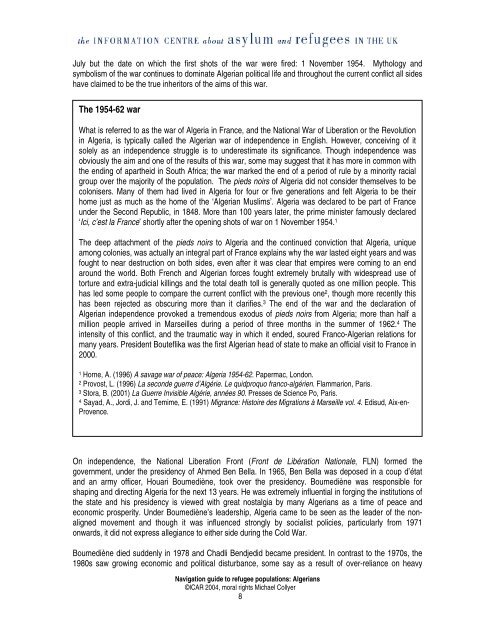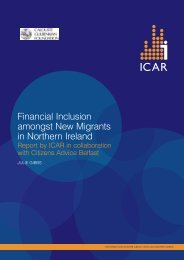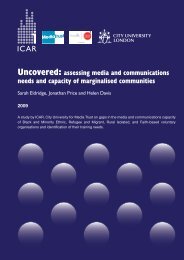Navigation guide Refugee populations in the UK: Algerians - ICAR
Navigation guide Refugee populations in the UK: Algerians - ICAR
Navigation guide Refugee populations in the UK: Algerians - ICAR
Create successful ePaper yourself
Turn your PDF publications into a flip-book with our unique Google optimized e-Paper software.
July but <strong>the</strong> date on which <strong>the</strong> first shots of <strong>the</strong> war were fired: 1 November 1954. Mythology and<br />
symbolism of <strong>the</strong> war cont<strong>in</strong>ues to dom<strong>in</strong>ate Algerian political life and throughout <strong>the</strong> current conflict all sides<br />
have claimed to be <strong>the</strong> true <strong>in</strong>heritors of <strong>the</strong> aims of this war.<br />
The 1954-62 war<br />
What is referred to as <strong>the</strong> war of Algeria <strong>in</strong> France, and <strong>the</strong> National War of Liberation or <strong>the</strong> Revolution<br />
<strong>in</strong> Algeria, is typically called <strong>the</strong> Algerian war of <strong>in</strong>dependence <strong>in</strong> English. However, conceiv<strong>in</strong>g of it<br />
solely as an <strong>in</strong>dependence struggle is to underestimate its significance. Though <strong>in</strong>dependence was<br />
obviously <strong>the</strong> aim and one of <strong>the</strong> results of this war, some may suggest that it has more <strong>in</strong> common with<br />
<strong>the</strong> end<strong>in</strong>g of apar<strong>the</strong>id <strong>in</strong> South Africa; <strong>the</strong> war marked <strong>the</strong> end of a period of rule by a m<strong>in</strong>ority racial<br />
group over <strong>the</strong> majority of <strong>the</strong> population. The pieds noirs of Algeria did not consider <strong>the</strong>mselves to be<br />
colonisers. Many of <strong>the</strong>m had lived <strong>in</strong> Algeria for four or five generations and felt Algeria to be <strong>the</strong>ir<br />
home just as much as <strong>the</strong> home of <strong>the</strong> ‘Algerian Muslims’. Algeria was declared to be part of France<br />
under <strong>the</strong> Second Republic, <strong>in</strong> 1848. More than 100 years later, <strong>the</strong> prime m<strong>in</strong>ister famously declared<br />
‘Ici, c’est la France’ shortly after <strong>the</strong> open<strong>in</strong>g shots of war on 1 November 1954. 1<br />
The deep attachment of <strong>the</strong> pieds noirs to Algeria and <strong>the</strong> cont<strong>in</strong>ued conviction that Algeria, unique<br />
among colonies, was actually an <strong>in</strong>tegral part of France expla<strong>in</strong>s why <strong>the</strong> war lasted eight years and was<br />
fought to near destruction on both sides, even after it was clear that empires were com<strong>in</strong>g to an end<br />
around <strong>the</strong> world. Both French and Algerian forces fought extremely brutally with widespread use of<br />
torture and extra-judicial kill<strong>in</strong>gs and <strong>the</strong> total death toll is generally quoted as one million people. This<br />
has led some people to compare <strong>the</strong> current conflict with <strong>the</strong> previous one 2 , though more recently this<br />
has been rejected as obscur<strong>in</strong>g more than it clarifies. 3 The end of <strong>the</strong> war and <strong>the</strong> declaration of<br />
Algerian <strong>in</strong>dependence provoked a tremendous exodus of pieds noirs from Algeria; more than half a<br />
million people arrived <strong>in</strong> Marseilles dur<strong>in</strong>g a period of three months <strong>in</strong> <strong>the</strong> summer of 1962. 4 The<br />
<strong>in</strong>tensity of this conflict, and <strong>the</strong> traumatic way <strong>in</strong> which it ended, soured Franco-Algerian relations for<br />
many years. President Bouteflika was <strong>the</strong> first Algerian head of state to make an official visit to France <strong>in</strong><br />
2000.<br />
1 Horne, A. (1996) A savage war of peace: Algeria 1954-62. Papermac, London.<br />
2 Provost, L. (1996) La seconde guerre d’Algérie. Le quidproquo franco-algérien. Flammarion, Paris.<br />
3 Stora, B. (2001) La Guerre Invisible Algérie, années 90. Presses de Science Po, Paris.<br />
4 Sayad, A., Jordi, J. and Temime, E. (1991) Migrance: Histoire des Migrations à Marseille vol. 4. Edisud, Aix-en-<br />
Provence.<br />
On <strong>in</strong>dependence, <strong>the</strong> National Liberation Front (Front de Libération Nationale, FLN) formed <strong>the</strong><br />
government, under <strong>the</strong> presidency of Ahmed Ben Bella. In 1965, Ben Bella was deposed <strong>in</strong> a coup d’état<br />
and an army officer, Houari Boumediène, took over <strong>the</strong> presidency. Boumediène was responsible for<br />
shap<strong>in</strong>g and direct<strong>in</strong>g Algeria for <strong>the</strong> next 13 years. He was extremely <strong>in</strong>fluential <strong>in</strong> forg<strong>in</strong>g <strong>the</strong> <strong>in</strong>stitutions of<br />
<strong>the</strong> state and his presidency is viewed with great nostalgia by many <strong>Algerians</strong> as a time of peace and<br />
economic prosperity. Under Boumediène’s leadership, Algeria came to be seen as <strong>the</strong> leader of <strong>the</strong> nonaligned<br />
movement and though it was <strong>in</strong>fluenced strongly by socialist policies, particularly from 1971<br />
onwards, it did not express allegiance to ei<strong>the</strong>r side dur<strong>in</strong>g <strong>the</strong> Cold War.<br />
Boumediène died suddenly <strong>in</strong> 1978 and Chadli Bendjedid became president. In contrast to <strong>the</strong> 1970s, <strong>the</strong><br />
1980s saw grow<strong>in</strong>g economic and political disturbance, some say as a result of over-reliance on heavy<br />
<strong>Navigation</strong> <strong>guide</strong> to refugee <strong>populations</strong>: <strong>Algerians</strong><br />
©<strong>ICAR</strong> 2004, moral rights Michael Collyer<br />
8

















